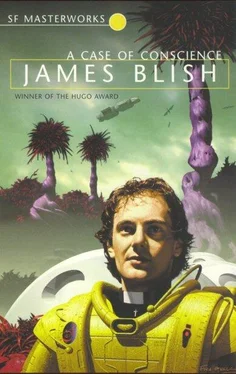In the fields where they had been given fair clues, they had made enormous progress. Despite the constant cloudiness and endemic drizzle, their descriptive astronomy was excellent, thanks to the fortunate presence of a small moon which had drawn their attention outward early. This in turn made for basic advances in optics, and thence for a downright staggering versatility in the working of glass. Their chemistry took full advantage of both the seas and the jungles. From the one they took such vital and diversified products as agar, iodine, salt, trace metals, and foods of many kinds. The other provided nearly everything else that they needed: resins, rubbers, woods of all degrees of hardness, edible and essential oils, vegetable “butters,” rope and other fibers, fruits and nuts, tannins, dyes, drugs, cork, paper. Indeed, the sole forest product which they did not take was game, and the reason for this neglect was hard to find. It seemed to the Jesuit to be religious—yet the Lithians had no religion, and they certainly ate many of the creatures of the sea without qualms of conscience.
He dropped the jungle suit into his lap with a sigh, though the popcorned tooth still was not completely trimmed hack into shape. Outside, in the humid darkness, Lithia was in full concert. It was a vital, somehow fresh, new-sounding drone, covering most of the sound spectrum audible to an Earthman. It came from the myriad insects of Lithia. Many of these had wiry, trilling songs, almost like birds, in addition to the scrapes and chirrups and wing-case buzzes of the insects of Earth. In a way this was lucky, for there were no birds on Lithia. Had Eden sounded like that, before evil had come into the world? Ruiz-Sanchez wondered. Certainly his native Peru sang no such song…
Qualms of conscience—these were, in the long run, his essential business, rather than the taxonomical mazes of biology, which had already become tangled into near-hopelessness on Earth before space flight had come along to add whole new layers of labyrinths for each planet, new dimensions of labyrinths for each star. It was only interesting that the Lithians were bipedal, evolved from reptiles, with marsupial-like pouches and pteropsid circulatory systems. But it was vital that they had qualms of conscience—if they did.
The calendar caught his eye. It was an “art” calendar Cleaver had produced from his luggage back in the beginning; the girl on it was now unintentionally modest beneath large patches of brilliant orange mold. The date was April 19, 2049. Almost Easter—the most pointed of reminders that to the inner life, the body was only a garment. To Ruiz-Sanchez personally, however, the year date was almost equally significant, for 2050 was to be a Holy Year.
The Church had returned to the ancient custom, first recognized officially in 1300 by Boniface VIII, of proclaiming the great pardon only once every half-century. If Ruiz-Sanchez was not in Rome next year when the Holy Door was opened, it would never be opened again in his lifetime.
Hurry, hurry! some personal demon whispered inside his brain. Or was it the voice of his own conscience? Were his sins already so burdensome—unknown to himself—as to put him in mortal need of the pilgrimage? Or was that, in turn, only a minor temptation, to the sin of pride?
In any event, the work could not be hurried. He and the other three men were on Lithia to decide whether or not the planet would be suitable as a port of call for Earth, without risk of damage either to Earthmen or to Lithians. The other three men on the commission were primarily scientists, as was Ruiz-Sanchez; but he knew that his own recommendation would in the long run depend upon conscience, not upon taxonomy.
And conscience, like creation, cannot be hurried. It cannot even be scheduled.
He looked down at the still-imperfect jungle suit with a troubled face until he heard Cleaver moan. Then he arose and left the room to the softly hissing flames.
From the oval front window of the house to which Qeaver and Ruiz-Sanchez had been assigned, the land slanted away with insidious gentleness toward the ill-defined south edge of Lower Bay, a part of the Gulf of Sfath. Most of the area was salt marsh, as was the seaside nearly everywhere on Lithia. When the tide was in, the flats were covered to a depth of a yard or so almost half the way to the house. When it was out, as it was tonight, the jungle symphony was augmented by the agonized barking of a species of lungfish, sometimes as many as a score of them at once. Occasionally, when the small moon was unoccluded and the light from the city was unusually bright, one could see the leaping shadow of some amphibian, or the sinuously advancing sigmoid track of the Lithian crocodile, in pursuit of some prey faster than itself but which it would nonetheless capture in its own geological good time.
Still farther—and usually invisible even in daytime because of the pervasive mists—was the opposite shore of Lower Bay, beginning with tidal flats again, and then more jungle, which ran unbroken thereafter for hundreds of miles north to the equatorial sea.
Behind the house, visible from the sleeping room, was the rest of the city, Xoredeshch Sfath, capital of the great southern continent. As was the case in all the cities the Lithians built, its most striking characteristic to an Earthman was that it hardly seemed to be there at all. The Lithian houses were low, and made of the earth which had been dug from their foundations, so that they tended to fade into the soil even to a trained observer.
Most of the older buildings were rectangular, put together without mortar or rammed-earth blocks. Over the course of decades the blocks continued to pack and settle themselves until it became easier to abandon an unwanted building than to tear it down. One of the first setbacks the Earthmen had suffered on Lithia had come about through Agronski’s ill-advised offer to raze one such structure with TDX; this was a gravity-polarized explosive, unknown to the Lithians, which had the property of exploding in a flat plane which could cut through steel girders as if they were cheese. The warehouse in question, however, was large, thick-walled, and three Lithian centuries old—312 years by Earth time. The explosion created an uproar which greatly distressed the Lithians, but when it was over, the storehouse still stood, unshaken.
Newer structures were more conspicuous when the sun was out, for just during the past half-century the Lithians had begun to apply their enormous knowledge of ceramics to house construction. The new houses assumed thousands of fantastic, quasi-biological shapes, not quite amorphous but not quite resembling any form in experience, either; they looked a little like the dream constructions once made by an Earth painter named Dali out of such materials as boiled beans. Each one was unique and to the choice of its owner, yet all markedly shared the character of the community and the earth from which they sprang. These houses, too, would have blended well with the background of soil and jungle, except that most of them were glazed and so shone blindingly for brief moments on sunny days, when the light and the angle of observation were just right. These shifting coruscations, seen from the air, had been the Earthmen’s first clue as to where the intelligent life was hiding in the ubiquitous Lithian jungle. (There had never been any doubt that there was intelligent life there; the tremendous radio pulses emanating from the planet had made that much plain from afar.)
Ruiz-Sanchez looked out through the sleeping-room window at the city, for at least the ten thousandth time, on his way to Cleaver’s hammock. Xoredeshch Sfath was alive to him; it never looked the same twice. He found it singularly beautiful. And singularly strange: though the cities of Earth were very various, none was like this.
Читать дальше











